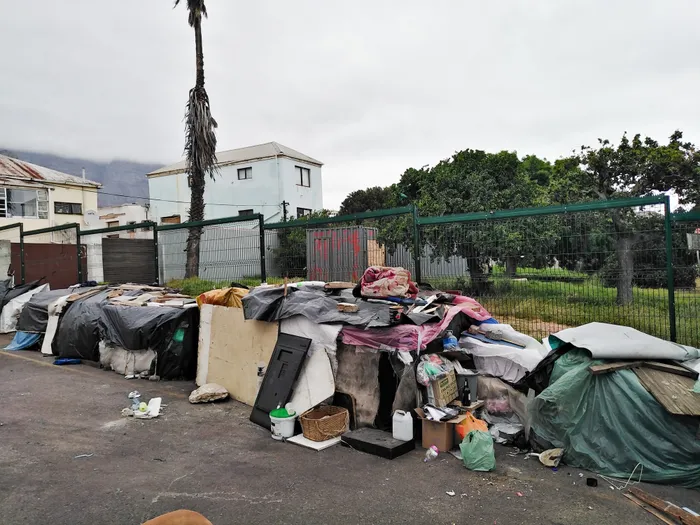Ongoing struggle to help the homeless

Homeless shelters near the Douglas Street parking area in Woodstock.
It was World Homeless Day on Sunday, but for two southern suburbs non-profits every day is like “homeless day” as they press on to help those on the margins of society.
U-Turn in Claremont has a three-phase programme that is built on rehabilitation, training and employment.
Elecia Rix, from Montague Village, was living on the streets for two years before getting help from U-Turn. She is now a receptionist at its head office. “The most difficult part,” she says, recalling her time on the streets, “was getting a place to sleep as there were threats from gangsters when it got dark.”
In 2017, she joined the U-Turn programme, going for rehabilitation and, later, training. “They are an organisation that believed in me and put faith in me,” she says. “It's amazing to be here.”
But for every success story, there are many more people still living on the streets. In a parking lot in Woodstock’s Douglas Street, 30 people live in crude shelters. Gadija Abrahams, a 50-year-old panelbeater from Bo-Kaap has been there for three months. It’s hard finding clean water or a place to wash or go to the toilet, but people bring them food, and she would rather be there than in a shelter, she says.
“I don’t want to stay in a shelter because there are too many rules and regulations.”
The Haven Night Shelter, has refuges for the homeless across the city, including one in Claremont. The organisation’s CEO, Hassan Khan, says they mark World Homeless Day by continuing their efforts to end homelessness.
Late last month, the City passed it new Unlawful Occupation By-law and an amended Streets, Public Places and Prevention of Noise Nuisances By-law. This has angered housing activists who accuse the City of criminalising homelessness.
Under the amended by-law, the City can issue a compliance notice to someone found sleeping in a public place and they can be found guilty of an offence and fined if they refuse an offer of alternative shelter.
The Unlawful Occupation By-law, according to the City, sets out existing powers of law enforcement to protect land and buildings from unlawful occupation, but does not grant new powers nor sanctions, other than what already exist in law.
The City says the by-law makes it easier for the City to act on behalf of private land owners and other entities when unlawful land-occupation attempts occur, and provides for the City to monitor, control, and regulate informal settlements.
Mayoral committee member for safety and security, JP Smith says the amened Streets by-law, combined with a range of social assistance, is the most humane way to help street people.
U-Turn director Jean-Ray Knighton Fitt says the City should be more strategic in supporting long-term rehabilitative solutions. “Punitive responses have proven historically to be ineffective, costly and counterproductive.”
Mr Khan says that while it’s not a crime to be homeless, the homeless are still subject to the laws of the land. “No one chooses to be homeless. However, every homeless person chooses where they sleep. It is the choice to sleep in the public space that isn’t lawful, especially since help is available to reintegrate, sleep in the City of Cape Town Safe Space or take up social work with hospitality services in shelters.”
In a statement on Monday, the City says its strategy to help the homeless includes a budget of R64 million for a street-people programme for 2020/21 and a reintegration unit that helps to reunite homeless people with their families and access IDs, social grants and employment training. The City’s Give Dignity campaign encourages the public to make donations to shelters and non-profits instead of to the homeless themselves.
To find out more about U-Turn, call 021 674 6119 or visit homeless.org.za. To find out more about the Haven Night Shelter, visit www.haven.org.za.
